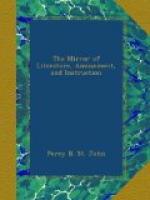In the reign of Edward the Third, an act of Parliament, made in the reign of William the Conqueror, was pleaded in the case of the Abbey of St. Edmundsbury, and judicially allowed by the court. Hence it appears (says a writer on this subject) that parliaments, or general councils, are coeval with the kingdom itself.
The first triennial parliament was in the year 1561; the first septennial one, in the year 1716.
Henry the Eighth increased the representatives in parliament 38; Edward the Sixth, 44; Mary, 25; Elizabeth, 62; and James the First, 27.
P.T.W.
* * * * *
ANCIENT BOROUGH OF LYDFORD.
(For the Mirror.)
Lydford is a poor, decayed village, consisting of ragged cottages, situated about seven miles from the north of Tavistock, Devonshire. It was (says Britton) formerly a place of consequence; and Prince states, that this ancient town and borough was the largest parish in the county, or the kingdom, and that the whole forest of Dart belonged to it; to whose parson, or rector, all the tithes thereof are due. It is said that this town, in its best strength, was able to entertain Julius Caesar, at his second arrival here in Britain; but, anno 997 it was grievously spoilt by the inhuman Danes. Recovering again, it had, in the days of the Conqueror, 122 burgesses. This is still the principal town of the Stannaries, wherein the court is held relating to those causes. There is an ancient castle, in which the courts are held; and offenders against the stannary laws were here confined, in a dreary and dismal dungeon, which gave rise to a proverb—“Lydford laws punish a criminal first, and try him afterwards.”
It appears from the Domesday Book, that Lydford and London were rated in the same manner, and at the same time.
Lydford formerly sent members to parliament, but was excused from this burden, as it was then considered, by pleading propter paupertatem.
P.T.W.
* * * * *
A WORD FOR THE READERS OF THE MIRROR.
Cadwallader Colden, in his Account of the Five Indian Nations of Canada, says—“They think themselves by nature superior to the rest of mankind, and call themselves Ongue-honwe—that is, men surpassing all others. The words expressing things lately come to their knowledge are all compounds. They have no labials in their language, nor can they pronounce perfectly any word wherein there is a labial; and when one endeavours to teach them to pronounce these words, they tell one they think it ridiculous that they must shut their lips to speak. Their language abounds with gutturals and strong aspirations: these make it very sonorous and bold; and their speeches abound with metaphors after the manner of the eastern nations. Sometimes one word among them includes an entire definition of the thing: for example—they call wine Oneharadeschoengtseragherie, as to say, a liquor made of the juice of the grape.”




